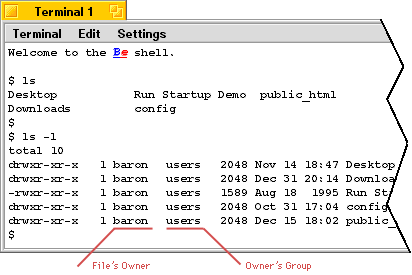
The Nefarious Baron Owns Your Files!
If you have ever used the BeOS command line, in the Terminal application, you've probably used the "ls" command to get a list of files in the current directory. And, moving up the expert curve a little, you have possibly also used the "ls -l" command to format that file list a little differently:

And, as many people have after using this command, you might have wondered who "baron" is, and why does he own all of your files (the third column of the listing holds the value for the owner for each file, by default, always "baron")?
Is this a sinister plot on the part of Be, to own all of the files created by the multitudes of BeOS users world-wide? Or perhaps more frightening, has Be been infiltrated by an evil hacker, bent on world domination through control of BeOS systems everywhere?
Actually, no. But the real answer is still fairly interesting! (Wait! Come back!)
The BeOS today is not a multi-user system, but we have laid much groundwork for the day when that will change. Eventually, files will be "owned" by the user who is logged in when the file is created. Then the column in the directory listing will have real meaning.
Until that day, though, the BeOS "ls" command simply fills in a default, system wide value for the owner of every file. By default, this user is "baron". But, if you want to own all your files yourself, it's pretty simple to change this, by configuring your UserSetupEnvironment settings:
- Open your boot settings folder:
/home/config/boot/ - Duplicate the "UserSetupEnvironment.sample" file, and rename it "UserSetupEnvironment".
- Open the document by double-clicking it.
- Scroll to the bottom of the document, and find the lines that
look like this:
# export USER=rms # export GROUP=gnu # export SHELL=/home/config/bin/tcsh - Delete the "#" and the spaces from the beginning of the first line (the USER line).
- Change the USER value from "rms" to your user name (short and
one word). It should now look something like this:
export USER=alderete - Do the same for the GROUP line, if you wish.
- Save your changes, and reboot your BeOS system.
Now when you run the "ls -l" command in the shell, you should see that you own all of the files. Cool -- and you may have saved the world from Baron!
Copyright © 1999 by Be, Inc. All rights reserved. Legal information (includes icon usage info).
Comments, questions, or confessions about our site? Please write the Webmaster.